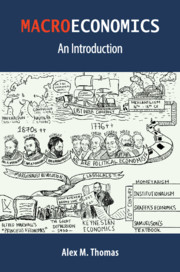Book contents
- Frontmatter
- Dedication
- Contents
- List of Illustrations
- List of Figures
- List of Tables
- Preface
- Acknowledgements
- Note to the Reader
- 1 What is Economics
- 2 Conceptualising the Macroeconomy
- 3 Money and Interest Rates
- 4 Output and Employment Levels
- 5 Economic Growth
- 6 Why Economic Theory Matters
- 7 The Policy Objective of Full Employment
- 8 The Policy Objective of Low Inflation
- 9 Towards Good Economics
- Data Sources
- References
- Index
6 - Why Economic Theory Matters
Published online by Cambridge University Press: 08 June 2021
- Frontmatter
- Dedication
- Contents
- List of Illustrations
- List of Figures
- List of Tables
- Preface
- Acknowledgements
- Note to the Reader
- 1 What is Economics
- 2 Conceptualising the Macroeconomy
- 3 Money and Interest Rates
- 4 Output and Employment Levels
- 5 Economic Growth
- 6 Why Economic Theory Matters
- 7 The Policy Objective of Full Employment
- 8 The Policy Objective of Low Inflation
- 9 Towards Good Economics
- Data Sources
- References
- Index
Summary
Introduction
Many textbooks of economics provide the reasons and rationale for the study of economic theory in the first chapter itself. Having already introduced you to the various macroeconomic theories—of money and interest rates, of employment and output and of economic growth—in the previous chapters, and by discussing the importance of economic theory in the present chapter, this textbook adopts a different approach. Moreover, note that this is a transition chapter, as the next two chapters deal with economic policy issues relating to unemployment and inflation, respectively. Just like some students in my economics classes, some of you might also wonder why learning economic theory is important. We have already remarked on the nature of theorising in Section 1.4 and the structure of a theory in Section 4.2. This chapter provides four substantive reasons for a close and critical study of economic theory (and their attendant models).
The need for discipline
Economic facts surround us, be it the price we pay for a ride in the autorickshaw, the value of our shopping expenses at the local vegetable market, the number of hours we spend at work, the number of hours of household work or the number of people who look for jobs daily. How do we decide which prices and quantities to focus on? Is it possible to process facts unaided? Or do we require some sort of a disciplining device akin to a sieve to sift through facts or a lens to magnify select facts? It is in such situations that theory plays an important role—by informing its student which of the key economic aspects to focus their attention upon. Often, these aspects are not directly observable, and will need to be measured or computed by the process of estimation or imputation. For instance, aggregate output (Y) is not directly observable, but, as we have noted in Chapters 4 and 5, it provides a useful indicator of the activity levels in an economy. Similarly, although we are able to see that people purchase food items, consumer durables and transportation, the relevant macroeconomic variable is aggregate consumption (C)—a directly non-observable variable.
- Type
- Chapter
- Information
- MacroeconomicsAn Introduction, pp. 116 - 137Publisher: Cambridge University PressPrint publication year: 2021



